An edited version was published in the 3rd December edition of The Scotsman and the 4th December edition of The Edinburgh Evening News.
A friend who is an archivist at the National Records of Scotland (NRS) told me about a rare document that would be on show yesterday, St Andrews Day, for just 5 hours, from 10 am - 3 pm in Edinburgh. One of two surviving documents with a personal connection to William Wallace, it’s known as “the Wallace Safe Conduct.”
It was a letter from King Philip IV of France to his agents at the papal court dated 7 November 1300. The document was under glass in the rotunda of the National Records Building and was last displayed in 2018.
The translation:
The Supreme Pontiff was Pope Boniface VIII (c. 1235-1303), who wanted nations to be at peace so he could begin a crusade. In 1299 he ordered Edward I of England to stop his war against Scotland.
The Franco-Scottish military and diplomatic alliance, the ‘Auld Alliance’, had been agreed in 1295 between France’s Philip IV and Scotland’s John Balliol. Both nations had a shared interest in curbing an expansionist and bellicose England. After Scotland’s defeat by the English at Falkirk in 1298, Wallace went to France where King Philip IV supported him financially.
Wallace was back in Scotland in 1303, leading raids against the English. When he was betrayed, captured and taken to London where he was hanged, drawn and quartered for treason on 23 August 1305, he was carrying a safe conduct letter from the King of France.
The letter survived and was kept with many other diplomatic letters in the English government archives and were stored in the Tower of London. Discovered in the 1830s, it’s now in the UK National Archives in Kew. The letter came back to Scotland in 2012 for the first time in 707 years on a two-year ‘loan’ to NRS, which has since been extended.
Other important national documents are rarely seen by the Scottish public. After a gap of 18 years, the 1320 Declaration of Arbroath went on display at the National Museum of Scotland for one month during the summer of 2023. The National Records of Scotland, not the National Archives, are custodians of the document.
There are vast holes in Scotland’s historical records. Edward I stole Scotland’s records during the Wars of Independence. The first war ended with the Treaty of Edinburgh-Northampton in 1329 which mandated the records’ return, but they stayed in London where many disappeared. When they were returned later, just 200 documents remained. Then in 1651 Oliver Cromwell stole a huge cache, taking them to London. They were lost for good when the ship carrying them back to Scotland sank in a storm in 1661. Among these were charters and records from the reigns of Robert the Bruce and David II and 15th and 16th century parliamentary papers.
Safely storing what was left was difficult.
“Although the Treaty of Union of 1707 specified that the public records were to remain in Scotland in all time coming, there was no public money available to provide adequate accommodation and supervision for them.”
The National Register House in Edinburgh finally opened in 1788 having been partially funded from forfeited Jacobite estates after Culloden in 1745.
It’s not known what other Scottish national records may reside in London or elsewhere. No one knows where the original Claim of Right 1689 is or if it even exists anymore. A condition of the 1707 Treaty of Union, it guaranteed the sovereignty of the People above any monarch or parliament and forms the constitutional basis of Scotland - Popular Sovereignty. I’ve been told by many Scots that they never learned about this and many other Scottish historical events at school.
A nation’s historical records inform national identity. As such, they should be freely available to the People to read, study and view.
In the United States, the Declaration of Independence, the Constitution and the Bill of Rights are on permanent public display in Washington, DC. They aren’t nearly as old as many of Scotland’s records, but a facsimile of important Scottish documents could be made available to the public and should form the basis of a Civics curriculum.
I hope the day soon arrives when an independent Scotland reclaims its national records and its national identity from its colonial master so that all Scots can learn about and be proud of their nation’s history.

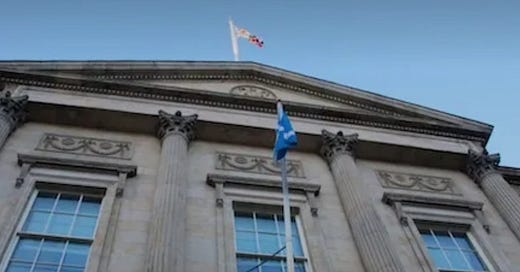



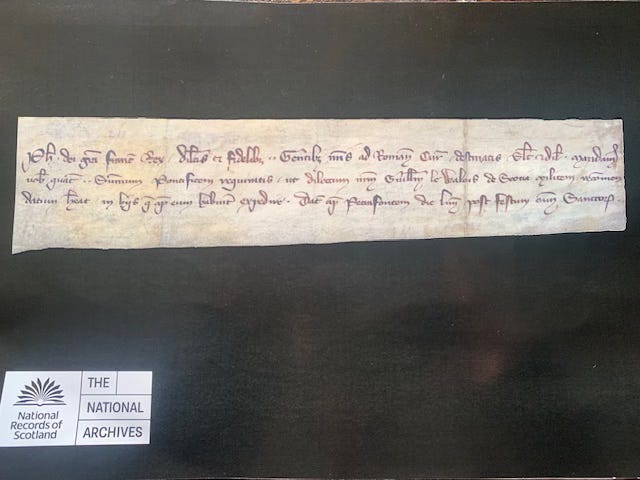
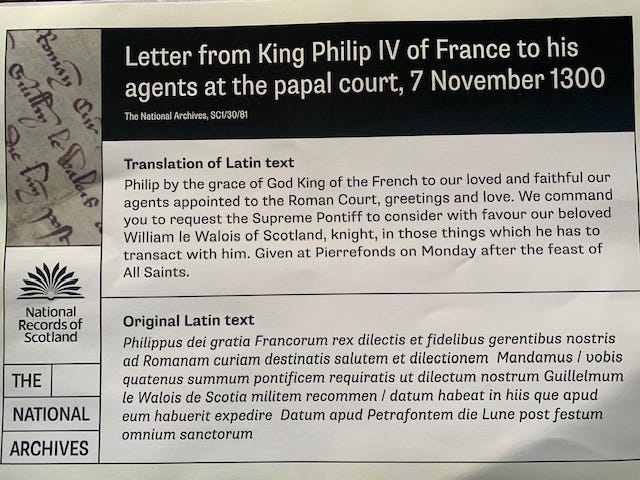
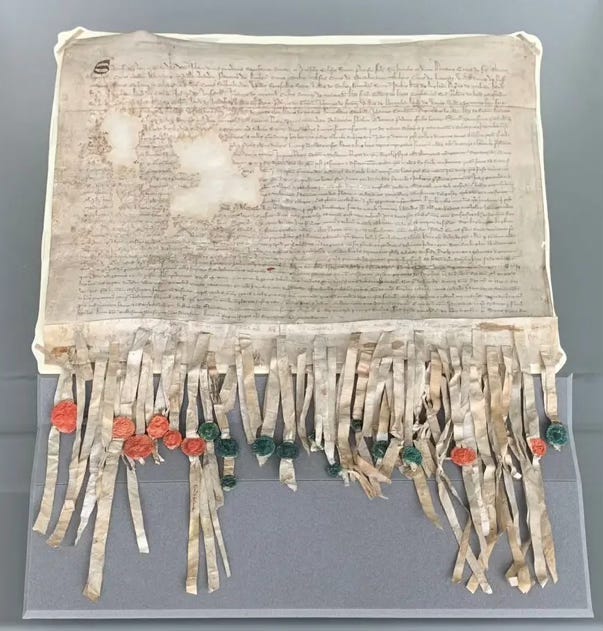
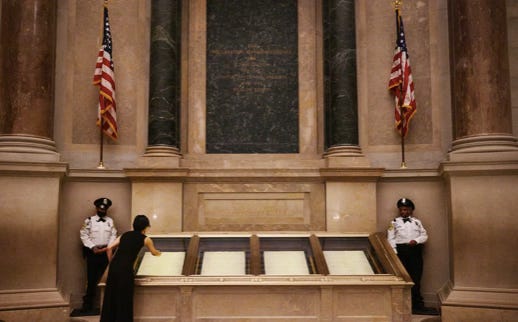
Thanks Leah. Very interesting, if rage inducing. The sods down that road succeeded in what we might now call cancelling Scotland. The history, culture and language all but finished off, except for a bit of tartan tat touristy remnants. It really angers me when my older Scottish neighbours still deny Scotland should be anything other than a vassal state of Engerland, one of them used to teach 'English' in Scotland, saying the kids 'didn't want to learn, they had nothing to look forward to' once they were of school leaving age! Sigh.
Scotland take back your country for christs sake. SNP need to be clever about how they frame things, because the Brit state sure is expert at how they frame things.
My experience (1947-1960) of the teaching of Scottish History in Scotland’s schools was decidedly sketchy: Bannockburn, Mary Queen of Scots, the Jacobite Uprising etc were taught, but there was much more about English and British Empire history. We heard about the Peterloo Massacre at Manchester, but not about the parallel uprising in Scotland (I only learned about the Scottish Weavers’ 1820 uprising in pursuit of democracy when I came across a book about it in my late 70’s; indeed much of my retirement has been spent in reading my country’s history and filling the knowledge gaps). We also heard about the English Wars of the Roses but not about the Covenanters’ uprising in Scotland. Likewise the use of Lallans Scots in the classroom was forbidden apart from one day per year - Rabbie Burns’ birthday – when it was tolerated (if only because otherwise his poetry couldn’t be heard).
The contempt of the English Elite for other peoples’ cultures and democratic rights is evident throughout the centuries of Empire; in its role in setting the maps of India and the Middle East (now being continued in the Chagos Archipelago); in the aftermath of Brexit where Gibraltar’s 96% Remain vote has still to be addressed (not to mention Scotland’s 62%); in their assumption that England’s unwritten so-called constitution takes precedence over the Acts of Union and indeed Scots Law. And let’s not forget the cavalier abandonment of promises made ahead of the 2014 Independence Referendum, the subsequent abandonment of the Sewell Convention and the roles of the UK Supreme Court and UK Government in blocking Holyrood legislation.
Take the UK Gov rejections of perfectly legitimate intra vires Holyrood legislation on Gender Reform and Recycling of Waste. The latter defies all logic: both Scotland and Wales wanted Waste Recycling to include glass, partly because of the dangers of broken glass to refuse collectors, walkers, and animals (domestic and wild). Westminster demanded that glass be excluded, but I’ve yet to see any reason why (logical or otherwise), so I’m left concluding it’s a crude way of signifying that England is in charge of everything and that in reality the devolved nations can do nothing about it. If that’s not colonialism at its crudest, I don’t know what is.